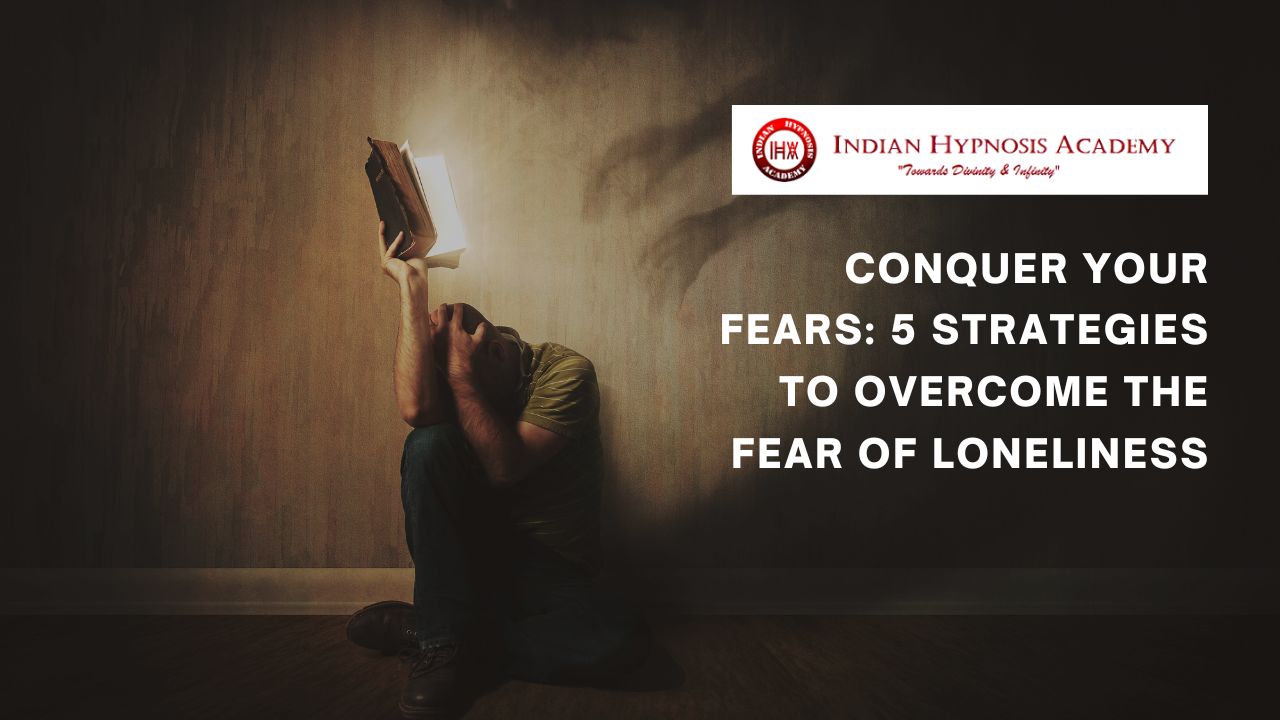Loneliness. It’s a feeling that can creep up on us when we least expect it, like a shadow in the corner of our minds. Whether we’re surrounded by people or sitting alone in a crowded room, the fear of loneliness can consume us and wreak havoc on our mental health.
But here’s the thing: loneliness doesn’t have to dictate our lives. We have the power to conquer this fear and embrace a life filled with meaningful connections and inner contentment. In this blog post, we’ll explore five powerful strategies that will help you overcome the fear of loneliness once and for all.
So buckle up, because it’s time to face your fears head-on and pave your own path towards happiness and fulfillment. Are you ready? Let’s dive in!
Understanding the Fear of Loneliness
Loneliness is not just about physical isolation; it’s a deep-seated fear that stems from our basic human need for connection and belonging. It’s that nagging feeling of being disconnected from others, of not having anyone to share life’s joys and sorrows with.
The fear of loneliness often arises from past experiences or traumas that have left us feeling abandoned or rejected. These experiences can create negative beliefs about ourselves, such as thinking we are unworthy of love and companionship.
This fear can manifest in various ways – avoiding social situations, constantly seeking validation from others, or even settling for toxic relationships just to avoid being alone. We may become overly dependent on others for our happiness and lose sight of our own individuality.
It’s important to recognize that the fear of loneliness is a common human experience. We are wired for connection, so it makes sense that the absence of meaningful connections can trigger feelings of sadness, anxiety, or even despair.
By understanding the root causes behind this fear and acknowledging its impact on our well-being, we can start taking steps towards conquering it once and for all. So let’s explore some strategies to overcome this daunting fear together!
The Effects of the Fear of Loneliness on Our Mental Health
Loneliness is a universal human experience that can have profound effects on our mental health. When we fear being alone, it can lead to a vicious cycle of negative emotions and thoughts. This fear can create feelings of anxiety, depression, and low self-esteem.
One of the most significant impacts of the fear of loneliness is its effect on our overall well-being. Constantly worrying about being alone can increase stress levels and contribute to chronic physical health issues such as heart disease and weakened immune system.
Additionally, this fear can also affect our ability to form meaningful relationships with others. When we are consumed by the fear of loneliness, we may find ourselves avoiding social situations or struggling to open up emotionally. This isolation further perpetuates feelings of loneliness and exacerbates existing mental health conditions.
Furthermore, the fear of loneliness can hinder personal growth and self-development. It may prevent us from taking risks or pursuing new opportunities because we are afraid to step outside our comfort zones. This stagnation can lead to feelings of dissatisfaction with life and missed chances for personal fulfillment.
In order to overcome this fear and protect our mental health, it is essential to address these underlying issues head-on. By challenging negative beliefs about being alone and embracing solitude as an opportunity for self-reflection, we can begin changing our perspective on solitude.
Building strong social connections is another crucial strategy in conquering the fear of loneliness. Engaging in activities that promote positive interactions with others will not only alleviate feelings of isolation but also foster a sense o
Strategy 1: Changing Your Perspective on Being Alone
The fear of loneliness can be overwhelming, but one powerful strategy to overcome it is by changing your perspective on being alone. Instead of viewing solitude as a negative experience, try reframing it as an opportunity for self-discovery and growth.
Embrace the idea that being alone doesn’t necessarily mean being lonely. Solitude can offer a chance for introspection and self-reflection; it allows you to connect with yourself on a deeper level. Use this time to explore your passions, hobbies, and interests. Engaging in activities that bring you joy will help shift your focus away from the fear of loneliness.
Challenge any negative thoughts or beliefs about being alone. Remind yourself that you are capable of enjoying your own company and that solitude can be rejuvenating rather than isolating. Practice positive affirmations to reinforce this new mindset.
Additionally, consider setting goals for personal development during periods of solitude. This could involve learning new skills or pursuing creative endeavors such as writing or painting. By focusing on personal growth and taking advantage of opportunities for self-improvement, you’ll begin to see the benefits of spending time alone.
Remember, changing your perspective takes time and effort. Be patient with yourself throughout this process and celebrate each small victory along the way.
Strategy 2: Building Strong Social Connections
Humans are social beings by nature. We thrive on connections and interactions with others. However, the fear of loneliness can often prevent us from reaching out and forming meaningful relationships. It’s time to conquer that fear and build strong social connections!
One way to start is by expanding your social circle. Join clubs or organizations that align with your interests and values. This will not only introduce you to like-minded individuals but also provide opportunities for growth and personal development.
Another effective strategy is to be proactive in nurturing existing relationships. Reach out to friends, family members, or colleagues whom you haven’t spoken to in a while. Schedule regular catch-ups or outings where you can bond over shared experiences.
Don’t forget the power of technology! In this digital age, there are countless platforms available for connecting with people who share similar hobbies or passions. Whether it’s joining online communities, participating in virtual events, or even trying out dating apps, technology can help bridge the gap between you and potential new connections.
When interacting with others, focus on quality rather than quantity. Cultivate deep connections by actively listening, showing empathy, and being genuinely interested in what others have to say. Remember that building strong social connections takes time and effort – it’s an ongoing process.
Don’t be afraid of vulnerability when forming new relationships. Opening up about your fears or insecurities allows others to connect with you on a deeper level – they may have experienced similar emotions themselves.
By implementing these strategies consistently over time while maintaining patience and perseverance, you’ll gradually overcome the fear of loneliness and cultivate strong social connections that enrich your life.
Strategy 3: Finding Comfort in Solitude
Solitude, often mistaken for loneliness, can actually be a source of peace and self-discovery. Embracing moments of solitude allows us to connect with ourselves on a deeper level. It offers an opportunity to reflect, recharge, and find comfort within our own company.
In today’s fast-paced world filled with constant social interactions and distractions, finding time for solitude may seem challenging. However, it is essential for overcoming the fear of loneliness. Start by creating intentional pockets of alone time in your daily routine.
During these moments of solitude, engage in activities that bring you joy and fulfillment. Whether it’s reading a book, practicing meditation or indulging in your hobbies, use this time as an opportunity to reconnect with yourself.
Instead of viewing solitude as something negative or isolating, reframe your perspective. Understand that being alone does not equate to being lonely; rather it gives you the chance to truly understand and appreciate who you are as an individual.
Finding comfort in solitude also means embracing self-care practices. Take care of your physical well-being by engaging in regular exercise and maintaining a healthy diet. Nurture your emotional well-being through journaling or therapy if needed.
By learning how to find comfort in spending time alone, you will gradually diminish the fear associated with loneliness. Remember that true happiness comes from within – embrace the beauty of solitude!
Strategy 4: Seeking Professional Help
Loneliness can be a challenging emotion to overcome, and sometimes it may feel overwhelming. If you find that your fear of loneliness is significantly impacting your mental health or overall well-being, seeking professional help can be a valuable strategy.
A therapist or counselor specializing in loneliness and related issues can provide the support and guidance you need. They have the training and expertise to help you explore the root causes of your fear, identify any underlying factors contributing to it, and develop coping mechanisms.
In therapy sessions, you’ll have a safe space to share your thoughts and feelings without judgment. Your therapist will work with you to create personalized strategies for managing loneliness and cultivating healthier relationships.
Remember that reaching out for professional help is not a sign of weakness but rather an act of strength. It shows that you are committed to taking control of your emotions and working towards a happier, more fulfilling life.
Don’t hesitate to consult with a mental health professional if you feel overwhelmed by loneliness. They can offer valuable insights tailored specifically to your needs, helping you navigate through this challenging journey towards healing.
Strategy 5: Practicing Mindfulness and Self-Care
In today’s fast-paced world, it can be easy to get caught up in the hustle and bustle of daily life. However, taking the time to practice mindfulness and self-care is crucial for overcoming the fear of loneliness.
Mindfulness involves being fully present in the moment, without judgment or attachment to our thoughts or emotions. By practicing mindfulness, we can learn to observe our fears and anxieties about loneliness without allowing them to consume us.
One way to cultivate mindfulness is through meditation. Taking just a few minutes each day to sit quietly and focus on your breath can help calm your mind and bring you back into the present moment.
Self-care goes hand-in-hand with mindfulness. It means prioritizing your own well-being by engaging in activities that nourish your body, mind, and soul. This could involve anything from taking a relaxing bath or going for a walk in nature, to indulging in a hobby or spending quality time with loved ones.
By practicing mindfulness and self-care regularly, you can develop a stronger sense of self-awareness and inner peace. This will not only help you conquer the fear of loneliness but also enhance your overall mental health and well-being. So take some time for yourself today – you deserve it!
Conclusion
Loneliness is a universal human experience, and the fear of loneliness can be a significant challenge to overcome. However, by implementing these strategies, you can conquer your fears and find inner peace.
Changing your perspective on being alone is the first step towards overcoming the fear of loneliness. Embrace solitude as an opportunity for self-reflection and personal growth. Build strong social connections through meaningful relationships that provide support and companionship.
Finding comfort in solitude is another powerful strategy to combat the fear of loneliness. Cultivate hobbies, pursue passions, and indulge in activities that bring you joy when you are alone. Remember, being alone does not equate to feeling lonely.
Seeking professional help should never be underestimated. A therapist or counselor can provide guidance and tools to address underlying issues contributing to your fear of loneliness. They will help you develop coping mechanisms while exploring the root causes of this fear.
Practicing mindfulness and self-care are essential components in conquering any fear or anxiety. Engage in activities that promote relaxation such as meditation or yoga. Take care of your physical health by exercising regularly, eating well-balanced meals, and getting enough sleep.



